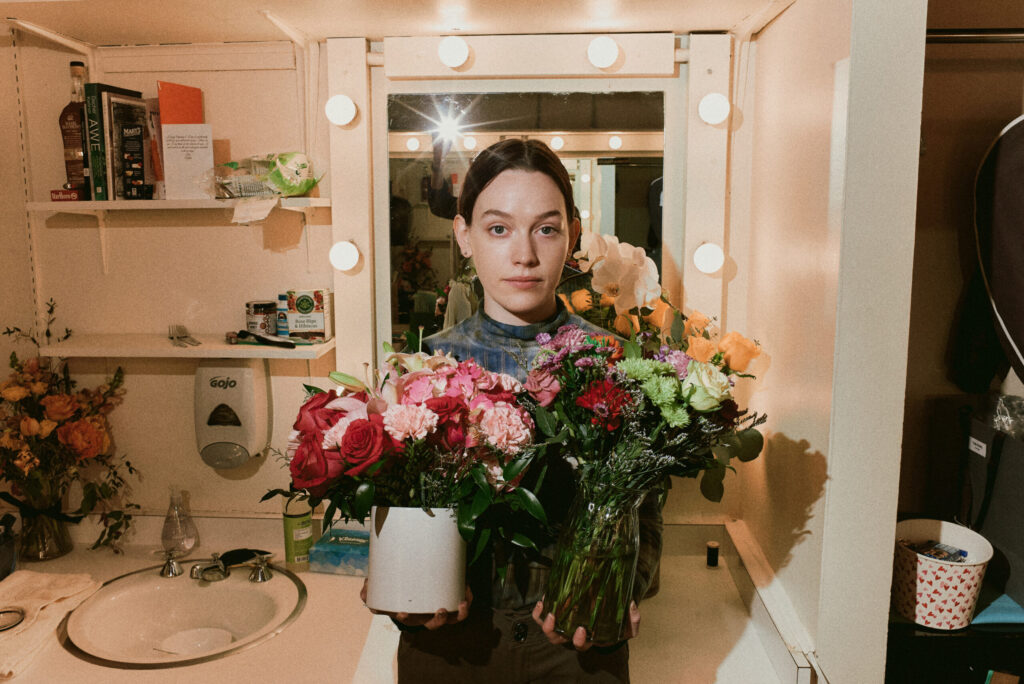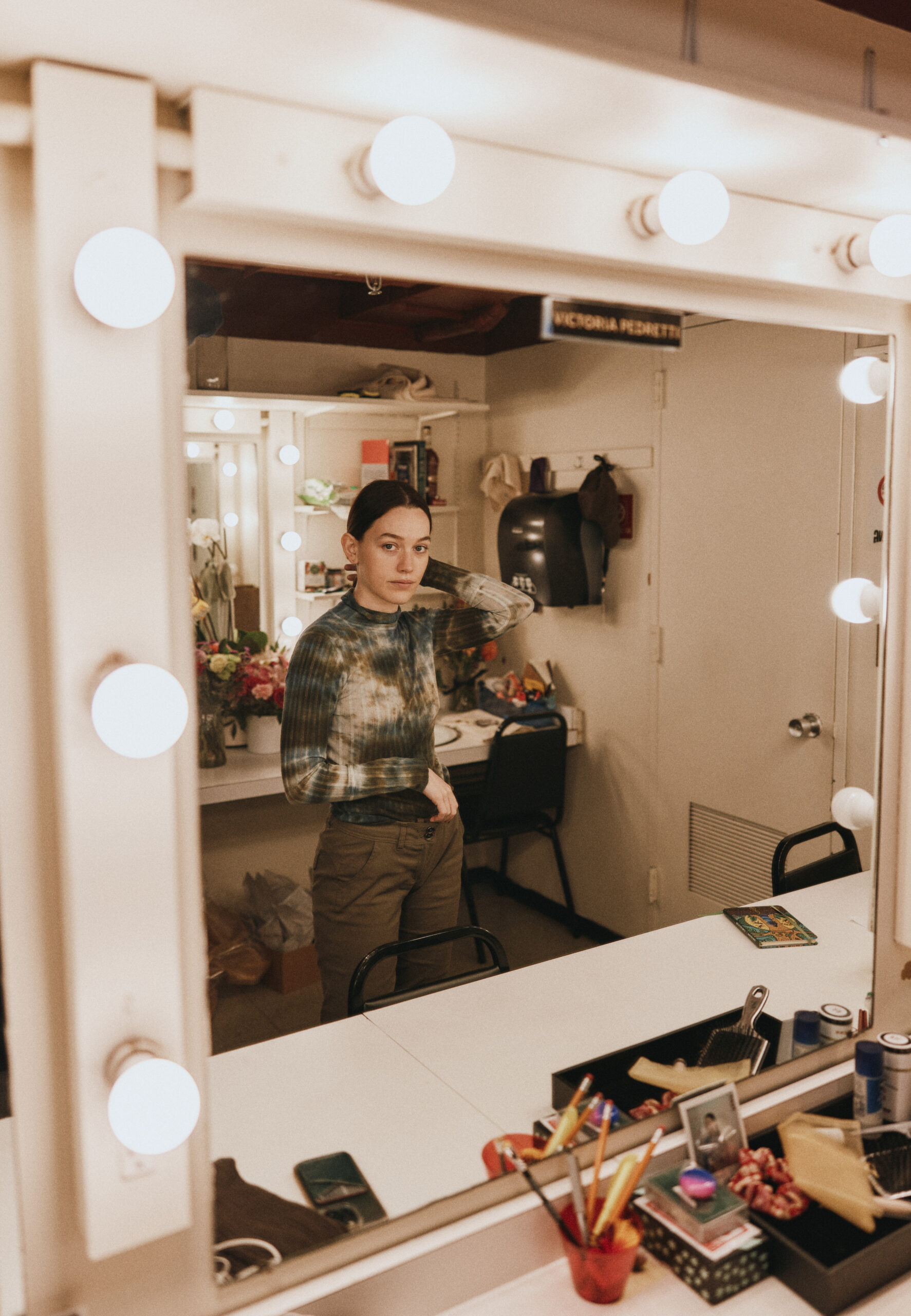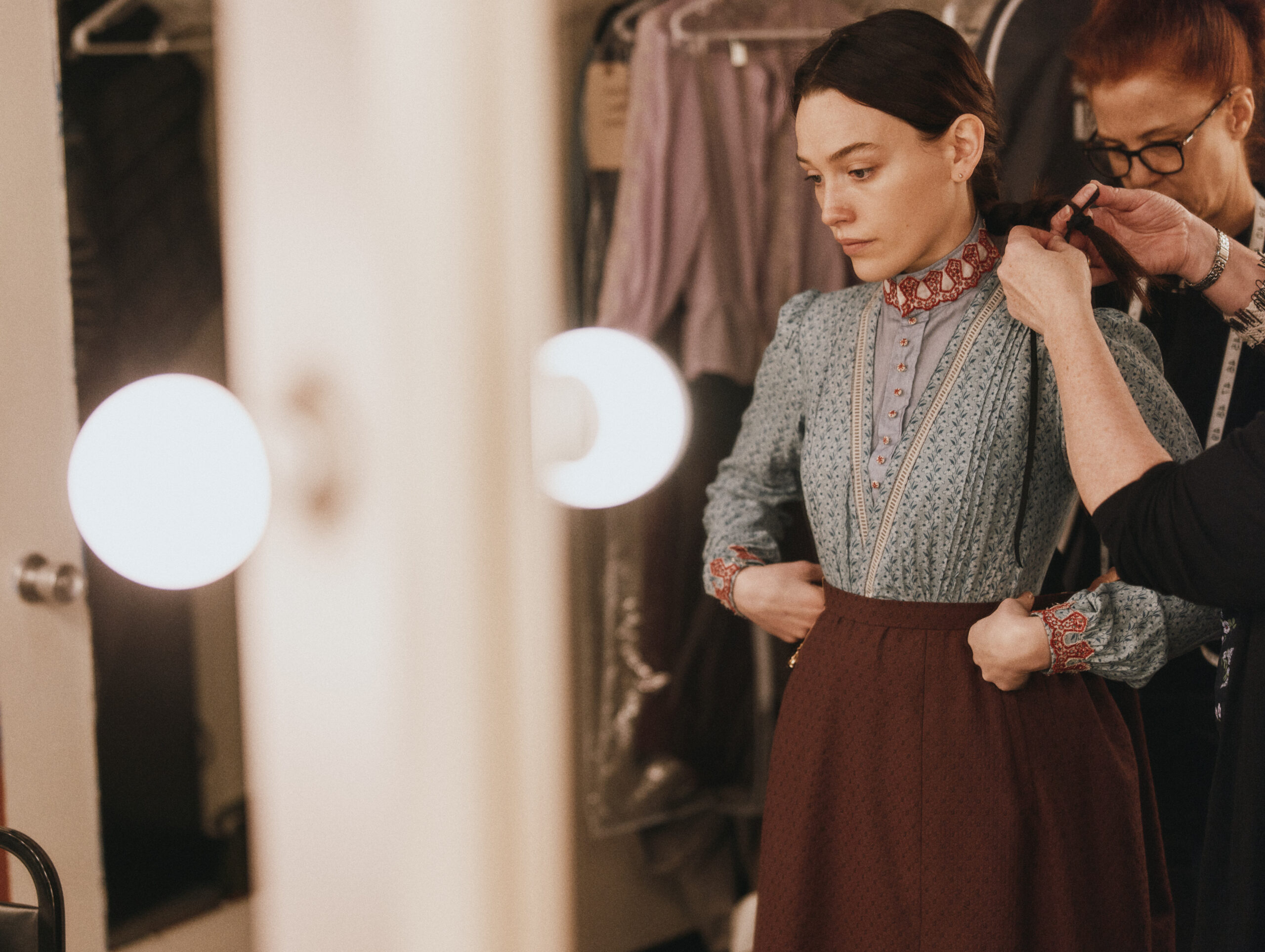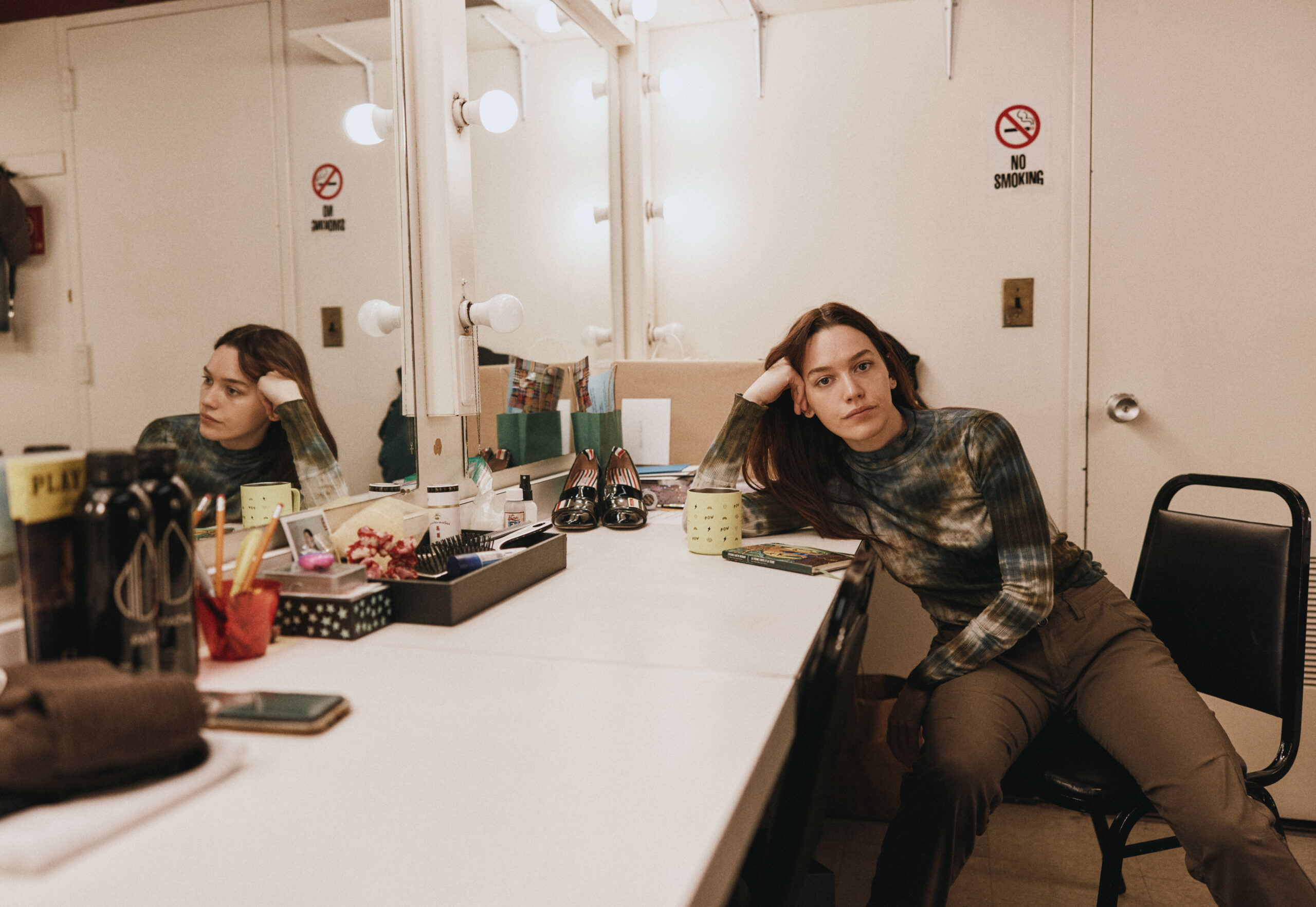If you’re at all active on the internet, you may have seen the viral video from an early preview of Amy Herzog’s Broadway adaptation of Henrik Ibsen’s play An Enemy of the People, now playing at Circle in the Square. During the play’s decisive town hall scene—when Dr. Thomas Stockmann, played by Jeremy Strong, makes a desperate appeal to his fellow civilians to take seriously his findings concerning contaminated water in the local bathhouse—demonstrators associated with the environmentalist group Extinction Rebellion staged a protest. “There is no Broadway on a dead planet,” they howled, while Strong and his co-star Michael Imperioli, playing the mayor seeking to stifle Stockmann’s report to protect the coffers of the spa’s shareholders, addressed the protesters in character, briefly turning the stage into a site of both real and fictitious ideological strife. Ibsen, one imagines, would have relished the moment.
“It’s exciting to see what can happen in live theater,” says the actor Victoria Pedretti, who plays Stockmann’s similarly principled daughter, Petra, in her Broadway debut. “I think all of us weren’t quite sure what was going on.” The 29-year-old has spent the last several years in Los Angeles, cutting her teeth on screen work in hit television shows like You and the Netflix horror anthology series The Haunting. But theater, which she studied in college, has always had her heart, and Ibsen’s dense, voluble dialogue has allowed her to exercise the kinds of muscles that often harden when an actor works mostly on screen. “I have alway believed in the joy of going out there for however long and the energy starts flowing and you share it with the audience and nobody says cut,” she said on Zoom the morning after I saw her in An Enemy of the People. Our interview, excerpted below, featured its own, albeit less dramatic interruption from Pedretti’s cat, Cayenne, who’s joined her in New York for the show’s theatrical run.
———
JAKE NEVINS: Hey there, Victoria.
VICTORIA PEDRETTI: Hi, Jake.
NEVINS: How are you?
PEDRETTI: I’m all right. How are you?
NEVINS: I’m good. I got to see the show last night and I really enjoyed it. Congratulations on your Broadway debut.
PEDRETTI: Thank you.
NEVINS: I’m curious how you came to it. Have you done Ibsen before?
PEDRETTI: Well, I studied theater in college. But I was not super familiar with this play in particular until I got the audition for the role. I was living in L.A. and I sent in a self-tape. That was my first round. Then I was offered an audition in New York, so then I came out and I did two callbacks.
NEVINS: Obviously, you’d been working mostly in film and television. As it happens, a lot of actors I’ve interviewed find themselves craving stage work. Was that the case for you?
PEDRETTI: I feel the same way. I think it’s very different. I didn’t have much of any experience in film and television before I stepped on a set to work on a job I got two months out of college. We had minimal classes about film in school, but most of what I was doing was training for the sake of theater, and practicing in theater, and collaborating to make theater. And I really have alway believed in the joy of going out there for however long and the energy starts flowing and you share it with the audience and nobody says cut.
NEVINS: Especially so with Ibsen. There’s so much to chew on. What was it like reading the play for the first time?
PEDRETTI: Well, I don’t do it in the original Norwegian.
NEVINS: I bet you could.
PEDRETTI: Thank you for your faith in me. I’m not opposed to trying, but I really love how Amy has adapted the story and the language. What Amy has done, I think it’s so perfectly constructed. I feel like every night it’s just about meeting that, mostly. I’ve always really enjoyed working with more, I don’t know, heightened texts, as opposed to contemporary texts, I guess. I haven’t done it since college, although I did a lot of it then and I’d be happy to do more of it. I think the challenge really does grow you as an actor. I had some muscles that had weakened or frozen up or just weren’t functioning with as much strength and agility as they used to. And this process has definitely reawakened something in my body and in my brain and soul.
NEVINS: What sorts of muscles?
PEDRETTI: I can say very literally, your tongue, your articulation.
NEVINS: What spoke to you about this text in particular?
PEDRETTI: It’s a pretty timeless story about truth and justice and corruption. It’s about community and what we think our duty is to our community. I find all of that very interesting.
NEVINS: The play’s contemporary resonance is especially pronounced the way it’s been staged in the round. Your character Petra shares in her father’s idealism. Did you identify with that?
PEDRETTI: Yeah, I don’t really like talking about… Especially since I’m still doing the play, I don’t want to feel separate from her or it. I guess we’re different and similar. I’m sorry, I don’t know how to answer that. We definitely have stuff in common. I can say that for sure.
NEVINS: What’s it like working with Jeremy Strong and Michael Imperioli? Were you fans of theirs beforehand?
PEDRETTI: No, I wasn’t familiar with their work, but they’re amazing and I learned a lot from them. And they’re very kind, also.
NEVINS: I can’t help but ask about the climate demonstration that broke out during your show last week. I’m sure it was an unwelcome interruption, but it makes perfect sense in context.
PEDRETTI: She certainly wanted people to engage and we did ask, “Does anyone have any objections?” So yeah, it’s exciting to see what can happen in live theater. I think all of us weren’t quite sure what was going on. And Jeremy and Michael responded to it so immediately and so fully in character that even I really wasn’t sure. It seemed like they knew what was going on, but they were also not prepared.
NEVINS: Did you guys talk about it afterwards?
PEDRETTI: No, we didn’t talk about it. We all just went home.
NEVINS: I can’t tell if you’re joking…
PEDRETTI: Yes [Laughs]. Of course we talked about it.
NEVINS: Right. I get the sense that’s proprietary. So, you’ve been living in Los Angeles, right?
PEDRETTI: I’m from the East Coast. But yeah, I spent the past three years in L.A.
NEVINS: How is it being back in New York? Are you enjoying the rhythms of doing eight shows a week?
PEDRETTI: So much. When I was a kid, I always dreamed of living here, and then I did for a few years. And L.A. was fascinating to me in that it is so different from how I grew up. But I’m really, really grateful to be back here. It feels right. Are you in L.A. right now?
NEVINS: No, I’m in New York.
PEDRETTI: There’s no place I’d rather be. And doing theater, it’s very ideal. I’d love to keep doing this.
NEVINS: On that note, tell me some other playwrights you admire.
PEDRETTI: I don’t know. I haven’t thought about theater a lot since I was in college, so I’m sure a lot of people are writing that I don’t even know. I remember in college, though, when I was still reading a lot of plays, I really loved Annie Baker.
NEVINS: So good.
PEDRETTI: I remember there being a lot of silence built into her plays and that being really fascinating. It’s very different than what I’m doing right now.
NEVINS: Certainly. Ibsen is very wordy.
PEDRETTI: I can’t think of anything else. [Pedretti’s cat enters] Oh, hello.
NEVINS: Oh, hello. Who’s this?
PEDRETTI: This is my cat.
NEVINS: What’s their name?
PEDRETTI: Cayenne.
NEVINS: Hi, Cayenne.
PEDRETTI: I’ve had him for three years. He can be a little clingy.
NEVINS: He seems awfully affectionate.
PEDRETTI: He is.
NEVINS: I’ll leave you two be. But before you go, what’s down the pipeline for you? Would you like to do more theater?
PEDRETTI: Nothing is on the books, but I would love that. I would love to be doing theater consistently in my life.
NEVINS: Have you gotten a chance to see any shows while you’ve been in New York?
PEDRETTI: No, unfortunately. I got here and I was immediately in rehearsals. And now it’s very hard for me to see shows, but I’m going to start prioritizing that.




